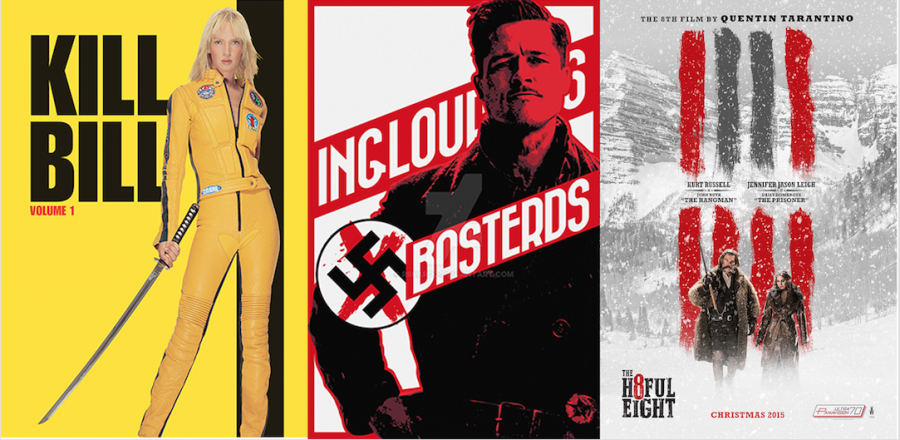Quentin Tarantino films lack original storylines
New action film “The Hateful Eight” will determine the Tarantino’s directing reputation
It’s Christmas day, and there’s this guy, and he’s walking down some main street somewhere, and the main street is full of movie theaters. Each movie theater is showing one Quentin Tarantino film following the year 2000. So this guy, he has to decide which film he wants to watch. He’s mulling it over, because he’s got half an hour before any of the films start, and then it hits him: It doesn’t matter, because they’re all the same. They’re great. They’re brilliant examples of post-modern cinema, but they’re all the same: A flawed anti-hero in search of revenge. Think “Kill Bill” Volumes 1 and 2, where The Bride seeks out her attempted murderer. Think “Inglorious Basterds” where a group of Jewish militiamen go on a violent rampage through Nazi Germany. Think “Django Unchained” where a freed slave pursues his wife’s kidnappers. This Christmas, Tarantino’s latest, “The Hateful Eight,” will come out. Perhaps the aforementioned guy will decide to go see it, perhaps he will enjoy it, but unless Tarantino has gone for a completely different style to his previous films, this aforementioned guy will probably forget the film as soon as he leaves the theater.
There is no doubt that Tarantino is a cinematic genius. “Pulp Fiction” and “Reservoir Dogs” will go down in film history as masterpieces. Few pieces of filmmaking will ever beat “Django Unchained” for pop-culture relevance, having been referenced in countless top-ten hits throughout the English speaking world. But if Tarantino wants to truly be remembered as one of the greats, he needs to freshen up his stories. As wonderful as the heist movie or neo-western storyline is, it can become old-hat quite fast.
All of Tarantino’s characters end up somewhat detached, tending to take a sort of lone ranger approach to the various difficulties they are faced with. As a result, it becomes almost impossible for the audience to sympathize with them. Their personalities and general lack of emotion are so far away from that of the average human being that it makes almost all of them instantly forgettable (barring perhaps Butch Coolidge, Bruce Willis’ homespun, entrapped character in “Pulp Fiction”). While this makes for entertaining spectating and leaves us with a memorable storylines and excellent one-liners, the characters themselves seem to fade from one’s memory as fast as they appeared.
As soon as you enter The Campanile’s newsroom there is a quote by Maya Angelou on your right, next to the door: “People will forget what you said, people will forget what you did, but people will never forget how you made them feel.” In a sense, this applies to Tarantino as a director. While we have, of course, not forgotten what he has said (especially with his superbly crafted scripts), the emotions have long disappeared. Perhaps he seeks to evoke a sense of wonder at his own talent, but for the audience, it is nothing but a frosty wasteland of emotions.
It feels almost as if Tarantino is unwilling to go out of his comfort zone; he insists on using the same archetypal characters and similar aesthetics in all of his films. There is nothing wrong with attempting to preserve a unique style and voice in filmmaking — in fact, it is key that we as an audience understand that a film is by Quentin Tarantino. It is vital to his own legacy that his print be firmly inked onto every single film he directs. However, the films are beginning to feel like they are more about Tarantino than the story itself. We are wowed with dazzling displays of directorial skill and nous, but we are never truly introduced to the characters themselves.
One need only look at other great directors to see what Tarantino is failing to do. Tarantino’s hero, Akira Kurosawa, may have directed “Seven Samurai”, a film steeped in the violence Tarantino so loves and lacking any real touch of humanity to it at all. However, Kurosawa also wrote and directed “Dersu Uzala”, a film set in the Eastern Siberian forests about an aging local hunter’s struggle with humanity’s rapid expansion into the forests he holds so dear. It is one of Kurosawa’s most personal films, where we truly come to understand and sympathize with the sad futility of the old man’s struggle. The film was one of Kurosawa’s best and won him an Oscar for Best Foreign Film.
Tarantino has made it clear that he is intent on leaving a legacy as a filmmaker. If he truly wants to make his mark on cinematic history, it is vital that “The Hateful Eight” show a more human touch.
Your donation will support the student journalists of Palo Alto High School's newspaper

